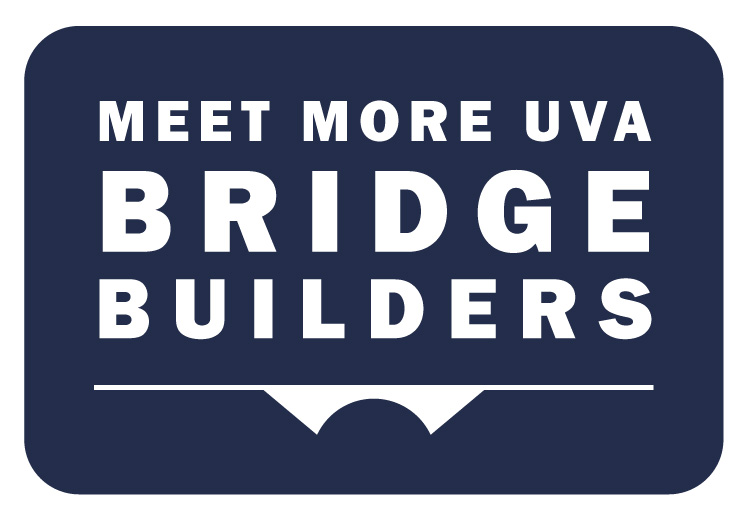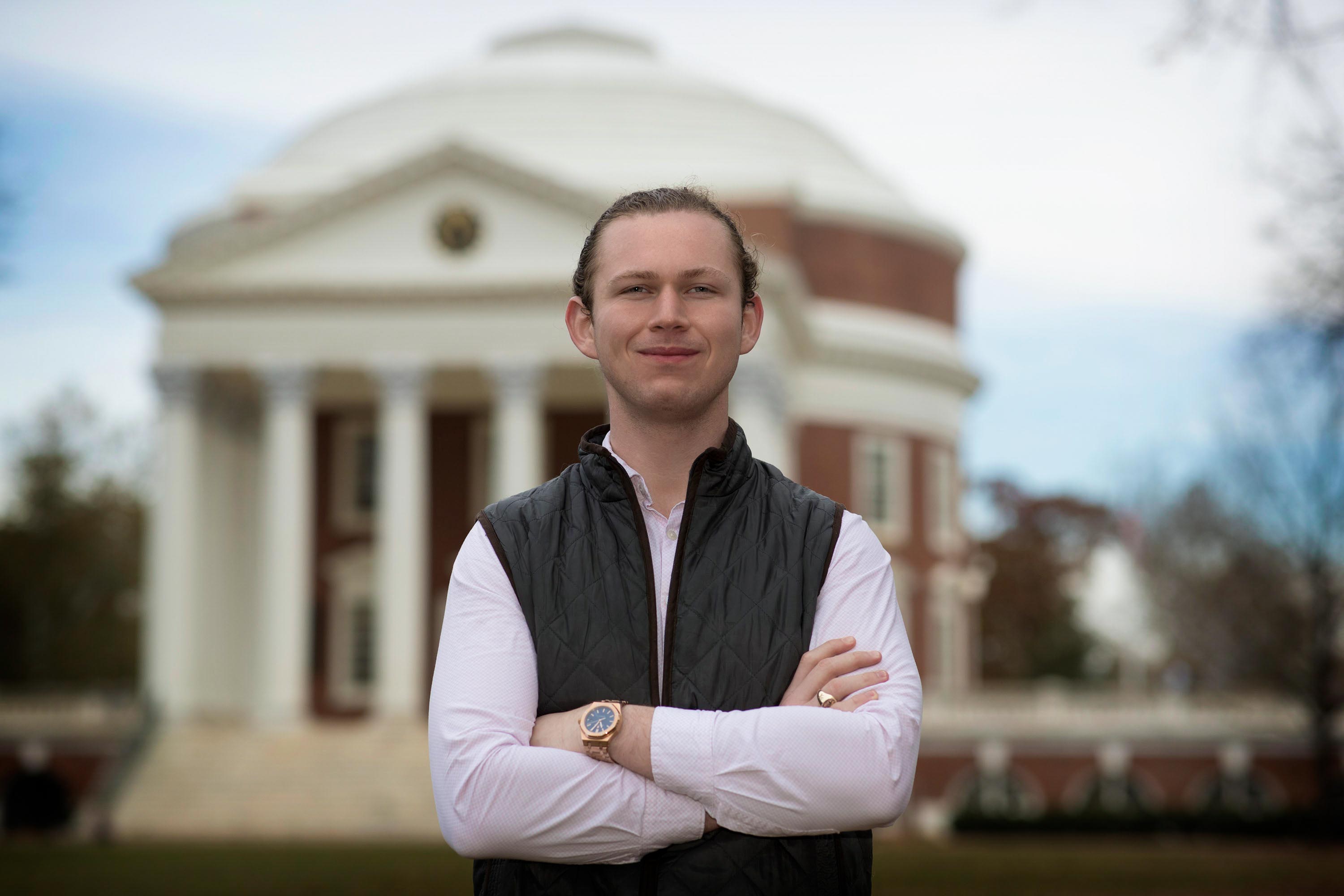Austin Widner and Levi Helm struck up a close relationship at the University of Virginia after realizing they were both from Virginia’s ruggedly beautiful Appalachian region, an area that fills the southwestern-most tip of the state.

“We recognized that we were the only two people that we knew from the area here, and we were wondering about how many other people there were at the University from west of Roanoke,” Widner said. “That’s generally where we categorize as Appalachia, as far as our in-state students go.”
Widner’s curiosity led him to reach out to the Alumni Association and the Office of Orientation and New Student Programs to learn more.
The enrollment numbers were lower than Widner hoped they would be – about 100 students hailed from the region – and he decided he wanted to do something about it. So in 2017, “Friends of Appalachia” was born.
“We were building our organization on three main pillars,” Widner said. “One, our main focus is on the immediate, and that’s the students who are here – building community for them, making sure that they have the ability to have that warmth, that comfort, those resources and give them access to resources and networking that other students from Northern Virginia and the Eastern Shore have here.
“The second tier of that would be alumni and reaching out, making sure that the alumni community is more engaged with the University.
“The third part of that is new students, who we’re heavily involved with, with the Virginia College Advising Corps. The Office of Admission was very adamant about reaching out to the Appalachian community and making sure that students know that not only is this a viable option for them and they belong here, but there is a community of people here that is waiting to welcome them.”
Widner and Helm began engaging high school students in their respective homes of Saltville and Craig County on behalf of the Office of Admission even before Friends of Appalachia launched.
“Levi and I, after doing one session of that my second year and his third year, we came out of that and we were like, ‘We could do this better, because this is not catered to the kids from our area, the culture of our area,’” he said.
Low-Income, First-Generation Students
The trouble that Widner and Helm found with those first high school visits was that the presentation of information about academic rank and rigor was off-putting.
“When you go in and you present that to a lot of kids who are low-income, first-generation, who think the ceiling is community college,” that approach does not work, Widner said. “It felt kind of backwards and not really progressive.”
The silver lining of that experience was that the message was not being delivered by a counselor from UVA; it was coming from a peer, with the same accent and many of the same lived experiences. It also showed that there is a community at UVA for students from Appalachia, and that those students are successful.
In Virginia, the Appalachian region also includes Buchanan, Dickenson, Lee, Russell, Scott, Tazewell and Wise counties.
For Widner, there was another commonality that gave him credibility in the eyes of those high schoolers. He himself is a first-generation student from a low-income household.
“My family are fifth-generation tobacco farmers,” he said. “We don’t own our own farm anymore, but I can distinctly remember the first conversation that I had with my dad after a long day working, and he just kind of looks at me and he’s like, ‘Do you wanna do this for the rest of your life?’”
Widner’s answer? “No.”
“Well, then you better figure out a way to pay for your college, because we can’t,” his dad replied to his then-fifth-grade son.
In high school, the straight-A student said he was fortunate to have an excellent guidance counselor who’d sent her own child to UVA. She told him he was a perfect fit and should not pass up on the opportunity.
“I was absolutely ignorant about how financial aid and scholarships work. Fortunately enough though, I was able to get enough scholarships as well as financial aid being from a low socioeconomic area that college was essentially paid for me, which was nothing that I even dreamt of until I already accepted the offer.”
A Second Visit to Chilhowie High School
Widner and Helm told their contacts in the admissions office that they felt the one-size-fits-all presentation they’d delivered to their high schools could be tailored to the region.
“There are a lot of other cultural barriers, as well as kind of like high jumps that you have to go over before you can really let those students know and let them feel comfortable that they belong, too,” he said.

The pair refined their pitch, talked more about the availability of financial aid and assured the students that there were people just like them at UVA ready with open arms.
“Our enrolling classes would not be complete without students from rural areas of the state of Virginia. Recruiting students from areas like Southside, Southwest, the Northern Neck and the Eastern Shore of Virginia is a top priority,” Greg Roberts, dean of undergraduate admission, said. “By partnering with Friends of Appalachia, we are able to strengthen our outreach and visibility in these areas. We are eager to connect prospective students with UVA students who come from similar backgrounds, because they have the credibility and experience needed to answer questions and concerns about student life, admission and college cost.”
Since Friends of Appalachia launched, the University has seen an increase in the number of applications from two key high schools in that region, resulting in an increase in the number of enrolled students at UVA.
For those who apply and are accepted, the personal touch continues. Widner, a double-major in environmental thought and practice and environmental science, with a minor in anthropology, joined several other students last January to pen hand-written notes to accepted students.
“So, we sat down, about 20 of us, and we cranked through the whole list of people that had been accepted west of Roanoke,” he said.
Welcome to UVA
Widner has been a senior orientation leader the last two summers, “so like literally every student, third-year and under from Appalachia, I’ve had some sort of personal interaction with at this university.”
During one of last summer’s orientation sessions, he came face-to-face with one of the students he wrote to. “Wait a minute,” said the student, “you wrote my letter!”
“It was like one of those moments where you see you coming full circle, and the cooler part about that is it also was a way for me to kind of plug our initiative as Friends of Appalachia to them and help bring them onboard,” he said. “And we’re comprised now of about 60 members, which is amazing. And they’re mostly first-years.”
Which means that Friends of Appalachia isn’t going anywhere.
Media Contact
Article Information
December 3, 2018
/content/appalachian-students-reach-back-offer-hand

